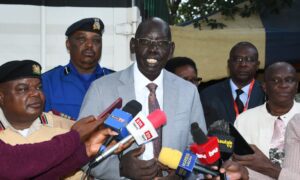Busia, Kenya – November 6, 2025:
A team from the Ethics and Anti-Corruption Commission (EACC) has arrested five traffic police officers stationed at Busia Police Station for allegedly demanding bribes from motorists along the Kisumu–Busia Highway, marking a new wave of the Commission’s ongoing nationwide anti-bribery crackdown targeting corrupt officers in Kenya’s public service.
The arrests took place at a roadblock located approximately five kilometres from Busia Town, an area notorious for reports of harassment and extortion by traffic officers manning entry and exit points into the busy border hub.
How the Operation Unfolded
According to a statement released by the EACC, the arrests followed weeks of intelligence gathering and public complaints from motorists and residents. The Commission’s investigators mounted a discreet surveillance operation after receiving numerous reports that police officers stationed at the roadblock were demanding cash bribes from drivers of public service vehicles, trucks, and private cars.
During the sting operation, the officers were allegedly caught soliciting and collecting money from motorists entering or leaving the border town — often without conducting any legitimate inspections or enforcing traffic laws.
The five suspects were identified as:
- Corporal Hezron Aburi
- Corporal Mary Nabei
- Police Constable James Weru
- Police Constable Mwakwekwe Nyoka
- Police Constable Aisha Abdullahi
Following their arrest, the suspects were taken to the EACC Western Regional Office in Bungoma for statement recording before being booked at Bungoma Police Station for further processing and possible arraignment.
EACC: No Sacred Cows in the War on Bribery
In a press statement, the EACC reaffirmed its commitment to eradicating corruption and bribery at critical public service points such as police stations, border checkpoints, hospitals, and licensing offices.
“The arrests are part of an intensified campaign to restore integrity within law enforcement and ensure equal access to public services,” the Commission stated.
“EACC will continue scaling up intelligence gathering and surveillance operations in high-risk areas, especially where the public interacts regularly with government officers.”
The Commission also urged Kenyans to report incidents of corruption through its toll-free hotline, digital whistleblowing platform, or by visiting any of its regional offices countrywide.
Bribery on Kenya’s Roads: A Deep-Rooted Problem
The Kisumu–Busia Highway is a key transport corridor linking western Kenya to Uganda and other East African nations. It serves as a major route for trade, tourism, and cross-border movement. However, over the years, it has gained notoriety for frequent cases of extortion and harassment by rogue traffic officers.
Motorists often complain about being stopped unnecessarily and forced to “settle” with officers to avoid prolonged detainment or trumped-up charges. In many cases, these illicit payments go unreported due to fear of retaliation or lack of confidence in internal police disciplinary mechanisms.
Experts note that such activities not only undermine road safety enforcement but also erode public trust in the National Police Service. According to Transparency International Kenya, bribery involving traffic officers remains among the top five most reported forms of corruption in the country.
EACC’s Wider Crackdown on Corruption
The Busia arrests are part of the Commission’s broader national anti-bribery campaign aimed at dismantling entrenched corruption networks within the police force and other public agencies. In recent months, EACC has conducted several high-profile operations leading to arrests of police officers, county enforcement officials, and licensing officers involved in similar schemes.
In October 2025, three police officers in Nakuru County were arrested for allegedly demanding Ksh 1,000 from matatu operators along the Nakuru–Eldoret highway. Earlier in August, EACC investigators in Mombasa nabbed four officers accused of soliciting bribes from truck drivers transporting goods from the port.
EACC Chairperson David Oginde recently emphasized that the Commission will continue working closely with the Office of the Director of Public Prosecutions (ODPP) and the National Police Service (NPS) to ensure all arrested officers face justice.
“There will be no sacred cows. Any public officer caught engaging in bribery will face the full force of the law. This is not only about punishing individuals but about restoring faith in public institutions,” said Oginde during a previous press briefing.
Police Reforms and Accountability
The National Police Service has repeatedly pledged to support anti-corruption measures within its ranks. The Inspector General of Police has previously issued circulars warning officers against engaging in bribery and extortion, emphasizing that such behavior tarnishes the image of the service.
However, despite numerous warnings and internal disciplinary actions, cases of police corruption persist, often due to weak enforcement of accountability mechanisms and the culture of impunity that has long plagued the force.
Civil society groups have urged the government to enhance collaboration between EACC, IPOA (Independent Policing Oversight Authority), and the Internal Affairs Unit to strengthen investigations and protect whistleblowers who expose corrupt officers.
Impact on Public Service Delivery
Corruption in traffic policing not only affects motorists but also disrupts trade and logistics, especially in regions dependent on road transport like western Kenya. Truck drivers and public service operators have often complained that bribery increases operational costs, leading to higher transport fares and reduced profitability.
According to EACC data, Kenya loses billions of shillings annually through small-scale bribery and kickbacks that occur daily at police roadblocks, customs checkpoints, and licensing offices. The Commission argues that curbing such corruption is essential for achieving the government’s Bottom-Up Economic Transformation Agenda (BETA), which prioritizes fair access to economic opportunities and efficient service delivery.
Public Reaction and Calls for Transparency
News of the arrests along the Kisumu–Busia Highway has sparked mixed reactions online. Many Kenyans commended the EACC for taking decisive action, calling for similar operations in other regions where bribery is rampant.
Others expressed skepticism, questioning whether the arrested officers would ultimately be prosecuted or if the cases would quietly fade away. Social media users on X (formerly Twitter) urged EACC and the National Police Service to publicize case outcomes to demonstrate accountability and deter future misconduct.
“We’ve seen many arrests before, but very few convictions. What Kenyans want now is transparency and follow-through,” wrote one user.
The Road Ahead: Sustaining the Anti-Bribery Momentum
EACC’s latest operation underscores a growing determination to eliminate corruption from Kenya’s roadways and restore confidence in public law enforcement. However, anti-corruption experts caution that sustainable success will require systemic reforms, including digital monitoring of traffic enforcement, body cameras for officers, and automated road surveillance systems.
The Commission says it is currently investing in technology-driven intelligence systems to track bribery hotspots in real-time, ensuring quick intervention and evidence-based prosecution.
As the arrested officers await further legal action, the EACC has once again urged all public servants to uphold integrity and professionalism in their duties, reminding them that corruption not only destroys careers but also undermines national development.
Conclusion

The arrest of five traffic police officers along the Kisumu–Busia Highway serves as a powerful reminder that Kenya’s war on corruption is far from over. With the EACC intensifying its operations nationwide, the pressure is now on all public institutions to embrace transparency, accountability, and ethical leadership.
Kenyans, meanwhile, continue to hope that these arrests will mark the beginning of real change — where honesty, not bribery, becomes the cornerstone of public service.



















